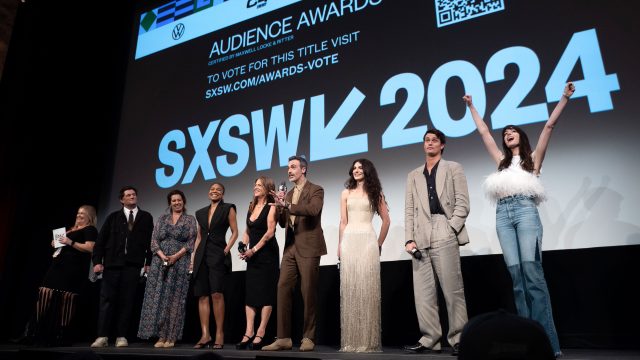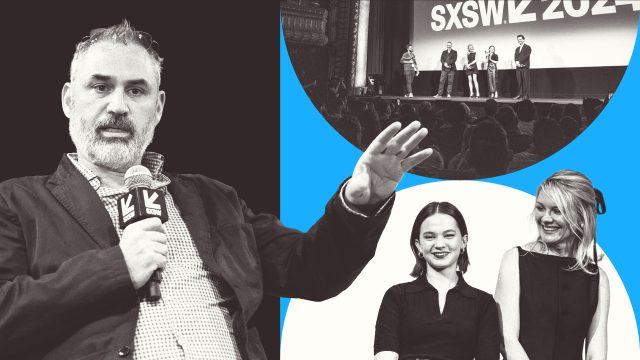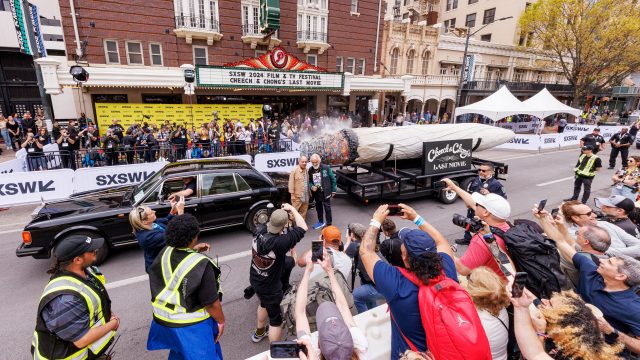Documentarian and author Erin Lee Carr had an epic 2019. First, she premiered two new documentaries — I Love You, Now Die: The Commonwealth Vs. Michelle Carter and At The Heart of Gold: Inside the USA Gymnastics Scandal. Her deeply personal memoir, All That You Leave Behind, came out in April. Somewhere in between those projects, she also filmed a four-part episodic series for Netflix.
“I have never before in my life been that busy,” says Carr. “It was one of those things where you’re like, does the to-do list own you, or do you own your success?”
Fortunately, Carr settled on a positive answer — this is what she wants to do. After wrapping up her busy year, Carr went to Florida to spend some time thinking up new projects, play with her newly adopted dog, and start planning her 2020 SXSW Film Keynote address.
“I’ve watched like 10 Keynotes, diagrammed them and I asked Mark Duplass, ‘What do you think I should do?’” she explains. “But a lot of what I realized about South By is it’s a lot about feeling. It’s about being honest, and those are not things you can necessarily super prepare for.”
Carr shared some of that honesty when talking about her past experiences at SXSW. On her first visit in 2011, she got alcohol poisoning, which caused her to question some choices. “This is such an incredible place, why am I drinking through it?” she remembers.
Since then, she’s switched to sobriety — the experience figures prominently in her memoir — and has enjoyed SXSW sober. “I’ve had two films premiere there. I’ve spoken on a panel. I’ve been there three times since. Each year, I’ve gotten to have some really dynamic experiences with a festival that is not about alcohol.”
“I can be ambitious and be sober. I can be young, and I can be sober. I can dance at South By and be sober,” Carr continues. “I think that it’s one of the biggest ingredients in this recipe of how I got here today, and how I hope to continue this in the future.”
Carr’s documentary career started back when she was an associate producer at Vice making videos for other journalists. When she realized the job wasn’t satisfying her ambitions, she started making her own short-form works. “I had the ego of youth saying, ‘I have good ideas and I want to make things!’” she says.
“But it really is about you making that first bet on yourself, and the idea has to be good.”
She learned that by keeping her costs low, she could make short videos on just about any subject, such as the internet, weapons or YouTube. “I was able to leverage those Vice videos into meeting with people like Sheila Nevins at HBO,” she says.
Over the years, many aspiring documentarians have asked Carr how to make the jump into long-form filmmaking. “You have to look at what are the successful things in the marketplace,” she says. “What are people watching? You have to crown your first thing based on that.
“I think that you are able to get in front of people more so than ever before,” she continues. “But it really is about you making that first bet on yourself, and the idea has to be good.”
Luckily for Carr, her training in storytelling and learning how to find a good idea started early. “I don’t want to be another person who gives a man credit, but I was very closely mentored by my father, David Carr who was a journalist at The New York Times and a huge South By fan,” she says. “I just grew up around storytelling. I read books. I watched movies. I watched documentaries. We talked about cinema. I think that there comes a fair amount of privilege — I understood at a basic level what good storytelling is because I was surrounded by it.”
Although Carr knew she didn’t want to follow her father’s footsteps into journalism, she found documentary filmmaking and decided on an approach that sets her work apart from the standard true crime format. “I’m going to participate in something called radical empathy,” she says. “I’m going to look at these crime stories, not from the perspective of the perpetrator or what happened. It’s really about what happened the days before the crime? What are the days after the crime happened, and what does that mean? What is the sum total of those actions?” Carr refers to radical empathy as her North Star, guiding her to listen more to her subjects during interviews and informing her research.
As of early January, Carr hadn’t yet settled on a keynote topic, but she mentioned that she wished more filmmakers would talk about the financial hardships of getting a career off the ground. “You are not going to make money the first couple of years,” she says. “How are you going to do survival work? How are you getting money into it? Understand that if you put in this work now, it is the best job in the world. It’s so much fun, because you get to talk to people for a living.”
Add Erin Lee Carr's Film Keynote: How to Make a Must-see Documentary to your 2020 SXSW Schedule.
Photo courtesy of the speaker









